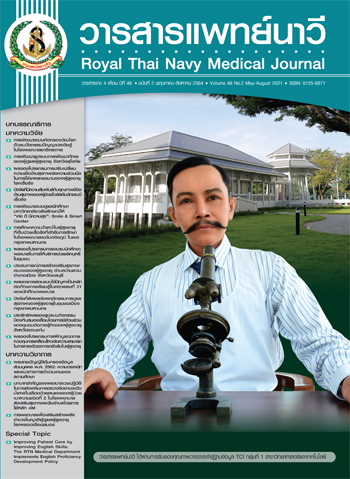ปัจจัยที่ส่งผลต่อพฤติกรรมการดูแลสุขภาพของผู้สูงอายุในชุมชนเมือง กรุงเทพมหานคร
Main Article Content
บทคัดย่อ
การวิจัยนี้มีวัตถุประสงค์เพื่อศึกษาปัจจัยที่ส่งผลต่อพฤติกรรมการดูแลสุขภาพของผู้สูงอายุในชุมชนเมือง กรุงเทพมหานคร กลุ่มตัวอย่างเป็นผู้สูงอายุ จำนวน 2,615 คน คัดเลือกกลุ่มตัวอย่างด้วยวิธีการสุ่มแบบหลายขั้นตอน เครื่องมือในการวิจัยเป็นแบบสอบถาม แบ่งเป็น 5 ตอน ได้แก่ 1) ข้อมูลส่วนบุคคล 2) พฤติกรรมการดูแลสุขภาพ 3) การรับรู้ความสามารถของตนเอง 4) แรงสนับสนุนทางสังคม และ 5) ความรอบรู้ทางสุขภาพ ตรวจสอบคุณภาพด้านความตรงเชิงเนื้อหาโดยผู้ทรงคุณวุฒิ จำนวน 5 ท่าน คำนวณค่าดัชนีความสอดคล้องรายข้ออยู่ระหว่าง 0.60 – 1 และค่าดัชนีความตรงเชิงเนื้อหาทั้งฉบับเท่ากับ 0.91 ตรวจความเที่ยงด้วยการใช้สูตรสัมประสิทธิ์แอลฟาของครอนบาค เท่ากับ 0.95, 0.90, 0.93 และ 0.91 ตามลำดับ วิเคราะห์ข้อมูลโดยสถิติพรรณนา ได้แก่ ร้อยละ ค่าเฉลี่ย ค่าเบี่ยงเบนมาตรฐาน ค่าสัมประสิทธิ์สหสัมพันธ์ของเพียร์สัน และค่าสัมประสิทธิ์สหสัมพันธ์พหุคูณ
ผลการวิจัย พบว่า 1) พฤติกรรมการดูแลสุขภาพของผู้สูงอายุโดยรวมอยู่ระดับปานกลาง (Mean = 3.33, SD = 0.89) 2) การรับรู้ความสามารถของตนเอง และแรงสนับสนุนทางสังคม อยู่ในระดับสูง (Mean = 3.79 SD = 0.70, Mean = 3.96, SD = 0.67 ตามลำดับ) ในขณะที่ความรอบรู้ทางสุขภาพอยู่ในระดับปานกลาง (Mean = 3.37, SD = 0.77) 3) ความรอบรู้ทางสุขภาพเป็นปัจจัยที่สามารถทำนายพฤติกรรมการดูแลสุขภาพของผู้สูงอายุได้สูงสุด รองลงมา คือ แรงสนับสนุนทางสังคมและการรับรู้ความสามารถของตนเอง (Beta = .67, .49, .31, p < .05 ตามลำดับ) โดยทั้ง 3 ตัวแปร ร่วมกันทำนายพฤติกรรมการดูแลสุขภาพของผู้สูงอายุในชุมชนเมือง กรุงเทพมหานคร ได้ร้อยละ 53.20 (R2 = .532, p = .003) การปรับเปลี่ยนพฤติกรรมสุขภาพของผู้สูงอายุบริบทชุมชนเมือง กรุงเทพมหานครให้ดีขึ้น บุคลากรทางสุขภาพควรจัดกิจกรรมเสริมสร้างความรอบรู้ทางสุขภาพ แรงสนับสนุนทางสังคม และการรับรู้ความสามารถของตนเอง
Article Details

อนุญาตภายใต้เงื่อนไข Creative Commons Attribution-NonCommercial-NoDerivatives 4.0 International License.
เอกสารอ้างอิง
Department of Older Persons. Measures to implement national agenda on aged society: 6 sustainable 4 change. [Internet]. [cited 2019 April 10]. Available from: http://www.dop.go.th/
download/knowledge/th1551432930-155_0.pdf. (in Thai).
Foundation of Thai Gerontology Research and Development Institute (TGRI). Situation of Thai elderly 2018. Institute for Population and Social Research. Nakhon Pathom: Mahidol University; 2019. (in Thai).
World Health Organization. Information needs for research, policy, and action on ageing and older adults in Africa meeting report: Harare, Zimbabwe, 20-22 January 2000. [Internet]. [cited 2019 April 12]. Available from: https://www.who.int/ageing/
publications/africa/en/.
Foundation of Thai Gerontology Research and Development Institute (TGRI). Situation of Thai elderly 2016. Institute for Population and Social Research. Nakhon Pathom: Mahidol University; 2017. (in Thai).
Orem DE, Taylor SG, Renpenning KM. Nursing: concepts of practice. 6th ed. St. Louis: Mosby; 2001.
Walter S. Holistic health, American holistic health association. [Internet]. [cited 2019 April 10]. Available from: http:// ahha.org/selfhelp-articles/holistic-health/.
Hjelm J. The dimensions of health: conceptual models. Burlington MA: Jones & Bartlett Learning; 2009.
Parti R. The four dimensions of wellness. [Internet]. [cited 2019 April 10]. Available from: http://vividlife.me/ultimate/33464/the-four-dimensions-ofwellness/.
Nutbeam D. Defining, measuring and improving health literacy. Health Evaluation and Promotion 2015;42(4):450-5.
Sorensen K, Van den Broucke S, Fullam J, Doyle G, Pelikan J, Slonska Z, et al. Health literacy and public health: a systematic review and integration of definitions and models. BMC Public Health 2012;12(80):1-13.
Tachavijitjaru C. Health literacy: a key indicator towards good health behavior and health outcomes. Journal of The Royal Thai Army Nurses 2018;19(Suppl 1):1-11. (in Thai).
Booranaklas W. Correlation between self-care behaviors, family relationship, and happiness of the elderly at the community Saimai district in Bangkok Metropolitan. JOPN 2017;9(2):25-33. (in Thai).
Sandee T, Leelukkanaveera Y, Homsin P. The effects of self-efficacy enhancement on health promotion behaviors, body weight and fasting plasma glucose among pre-diabetes in the community. Songklanagarind J Nurs 2017;37(2):53-6.
Government Gazette. The twelfth national economic and social development plan (2017-2021). [Internet]. [cited 2019 April 16]. Available from: http://www.ratchakitcha.soc.go.th/
DATA/PDF/2559/A/115/1.PDF [20 April 2019].
Taylor SG, Orem DE. Self-care deficit theory of nursing. In: Tomey AM, Alligood MR, editors. Nursing theorists and their work. Missouri: Mosby Elsevier; 2006.
Bandura A. Social learning theory. New Jersey: Englewood Cliffs; 1997.
House JS. Work stress and social support. MA: Addison-Wesley; 1981.
Intarakamhang U, Intarakamhang P. Health literacy scale and model of childhood overweight. J Res Health Sci 2017;17(1):1-8. (in Thai).
Institute for Population and Social Research. This report of the situation of the elderly in Thailand 2018. Bangkok: Duentula; 2019. (in Thai).
Faul F, Erdfelder E, Buchner A, Lang AG. Statistical power analyses using G*Power 3.1: tests for correlation and regression analyses. Behav Res Methods 2009;41(4):1149-60.
Srisa-ard B. Basic research. 9th ed. Bangkok: Suwiriyasarn; 2011. (in Thai).
Darun D, Krairat P. Health literacy factors influencing on health behavior of population in Bueng Kan province. Journal of Department of Health Service Support 2019;15(3):71-82. (in Thai).
Boonprakob T, Sasat S. Selected factors related to postoperative recovery in older person with total knee arthroplasty. Royal Thai Navy Medical Journal 2019;46(2):355-68. (in Thai).
Fivecoat HC, Sayers SL, Riegel B. Social support predicts self-care confidence in patients with heart failure. Eur J Cardiovasc Nurs 2018;17(7):598-604.
Karimy M, Koohestani Hr, Araban M. The association between attitude, self-efficacy, and social support and adherence to diabetes self-care behavior. Diabetol Metab Syndr 2018;10(1):86.


